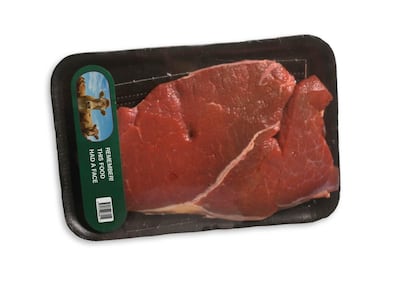Wouldn’t it be nice if… Carnivores became the odd ones out, #MeToo filtered down to the most vulnerable, Britain got over its Brexit wounds and the US and China made up.
‘The National’ staff pick 11 scenarios that would be a dream come true in 2019.
Wouldn't it be nice if...
1. Trump's peace plan actually worked?
Jack Moore, Assistant Foreign Editor
The year gone by has thrown up a lot of surprises for the Palestinians and supporters of their cause. But what if next year there was an even bigger shock: a United States peace plan, long in the making, which actually gave them what they wanted – a state of their own with internationally recognised borders, living side by side with Israel, with East Jerusalem as its capital, not the humiliating offer of Abu Dis. No West Bank confederation with Jordan, no pushing Gaza into Egypt's Sinai Peninsula and no passing the buck for the damage caused by Israel's occupation. Instead, the rejoining of both Palestinian territories to lay the ground for a contiguous state and improved prospects of Palestinian unity between rival factions Fatah and Hamas.
Israeli forces would withdraw from the West Bank, along with the 400,000 illegal settlers they protect for its “Greater Israel” enterprise. Children, women and men would be able to go to school and work without passing through checkpoints, without being harassed or searched, without fear of random shootings or assaults. There would be an end to the siege in Gaza so the economy can improve, there would be jobs that can lift residents out of misery and freedom of travel that would transform the enclave.

An American figure who has not funded illegal settlements would spearhead the plan. Not Jared Kushner or David Friedman, the son-in-law and bankruptcy lawyer-turned US ambassador who have profited from the Trump family for years and raised American cash for one of the most hardline Israeli outposts, Beit El, but someone with diplomatic experience who can hold court with both sides, an individual whom the Palestinians can trust. The US clawing back its stake as a fair and impartial mediator to deliver a real end to the conflict, but with support for any deal secured from the EU, Gulf, Russia and China.
There would be condemnation of Israeli attacks and policies in the West Bank and Gaza, as the US does with Palestinian attacks – home demolitions, extrajudicial killings and the sniping of both children and unarmed adults at border protests no longer going unpunished. Policies enacted in the past year would be reversed. The US embassy would be moved back to Tel Aviv until the contested city’s status is agreed. Funding returning to UNRWA, East Jerusalem hospitals that help sick Palestinians and coexistence programmes. Any plan must ensure that innocent and helpless people are not the victims of the plan, but rather the beneficiaries. If they are not, then everything else will be treated as hot air.
Leaders would have the courage to strike a deal, such as Israeli statesman Yitzhak Rabin who sought and could sell a vision of peace with the Palestinians, a policy that cost him his life at the hands of the Israeli far-right. They wouldn’t be so mired in corruption allegations that they’ll do anything to protect their position, not least act against the Palestinians to appease the far-right who want to replace them with an even more hardline vision for the conflict. And Palestinian leaders would remain defiant in the face of Israeli oppression, not seek self-preservation and co-operate with the Israeli government to consolidate the power of both themselves and their cronies.
For the ordinary Palestinian, this is just a dream. But wouldn’t it be nice?
2. People took their mindfulness journeys offline?
Rupert Hawsley, Features Writer
Are Instagram and mindfulness compatible? Don't worry, it's not a trick question – the answer is very definitely "no". Mindfulness, you see, is about being in the moment; it is about focusing on the sensations, whatever they may be, that you are experiencing right now.
Instagram, on the other hand, has been specifically designed to stop you doing this. As you scroll, your mind is coaxed from the present. Forgive me for spelling this out, but it really isn’t possible – like, not at all possible – to be in the moment if you’re thinking about what someone else is doing at some other time in some other place.
But try telling that to the 10.5 million people using the mindfulness hashtag on Instagram. Can none of them see the contradiction? Apparently not. “Tension is who you think you should be,” one recent post reads. “Relaxation is who you are.” Very true, no doubt, but I’d amend that to. “Tension is who you think you should be, particularly when you’ve been made to feel inadequate by spending an hour scrolling through Instagram.” Stick that in front of a pretty sunset.
Aside from the fact that posting about mindfulness is a virulent form of anti-mindfulness, it is also just so incredibly tedious for the rest of us. I’m glad for you if mindfulness is making you feel better. All I ask in 2019 is that you remember that posting about it makes the rest of us feel worse. And for those of you screaming, “Log off then!” – come on, don’t be silly.
This scourge of social media reached its nadir in 2018 when Twitter founder Jack Dorsey posted an 18-tweet thread about his meditation retreat in Myanmar. “I was able to focus entirely on my breath, without thoughts, for over an hour,” read one. Best of all, though, was when he used his Apple Watch to monitor his heart-rate. Because nothing says inner peace quite like checking your Apple Watch on the hour.
Social media has made narcissists of us all. But I don’t mind that. Holiday snaps, cute dogs, happy couples – all are entertaining enough. Posts about mindfulness are embarrassingly self-indulgent. By all means practise it – just have the good grace to be mindful of those who don’t. That way we can all be #happy.
3. Britain healed its own Brexit wounds?
Dave Stelfox, Deputy Comment Editor
Since June 23, 2016, Britain has been a divided country – bitterly and almost equally split between those who voted to leave the European Union and those who wished to remain part of it. Leavers are a mob of underemployed and over-tattooed bigots from the provinces, while remainers are an effete, superior bunch who live in leafy areas of big cities and probably get to work on Brompton bikes. At least that’s what some people want you to believe. The reality, as ever, is more complicated.
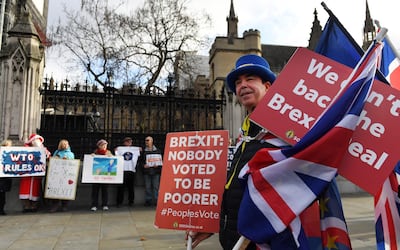
The decision to leave or remain came in many different shades. Take me for example. On a purely philosophical level, I was never keen on the idea of a largely unelected, supranational body having much say in my life. On a more practical one, I have, over the years, been appalled by the EU’s heavy-handed, austerity-driven approach to economically disadvantaged member states such as Greece, Portugal and Ireland. In spite of all these misgivings, I cast my vote to remain. This decision was made on the basis of economic pragmatism, an attachment to the idea that borders should always be as open as possible, and a belief that both the official and the unofficial leave campaigns were trading in outright lies and barely concealed racism. Similarly, a considerable number of traditional left-wing voters opted to leave on anti-capitalist grounds, while many outward-looking, free-market conservatives chose to stay.
Ever since the result was announced, many commentators have characterised the decision to leave as an incoherent, self-lacerating outpouring of rage from a “white working class” that had been “left behind”, incapable of making informed choices about its own future. This stereotype is probably more revealing than the ballot itself. An overwhelming number of affluent, older middle-class people voted to leave, too, largely based on a hankering for the past and the erroneous belief that “waves” of immigration have changed British society beyond recognition. Far less blame has been apportioned to them. The truth is, Britain is deeply divided, but the lines were not drawn in 2016. They are rooted in a system of privilege that has existed for centuries.
With the deadlines for the nation’s departure from the EU fast-approaching and the end result seeming evermore precarious, hostility between leavers and remainers is rising. And it is becoming increasingly clear that when – or perhaps if – Brexit happens, the road is not going to be smooth. But if there’s one lesson to be learnt from global political events of the past few years, it is that large sections of society cannot be left to flounder while others prosper. Should we wish to salvage anything from the ashes of Brexit, the new Britain that emerges must be based around inclusion, cohesion and equality of opportunity, not the insularity, personal enrichment and negligence that brought us here in the first place.
4. There were fewer #MeToo stories to share?
Nyree McFarlane, Features Editor
By the time I was 16, I had been inappropriately groped; had a man expose himself to me as I was waiting for a bus in the morning and had spent close to a decade fielding comments from men that made me feel uncomfortable in a way I wasn’t weary enough to fully understand (and I believe, from the conversations I’ve had, that I am one of the very lucky ones). Did I do anything at the time? No, because societal subtext tells young girls not to make a fuss. We are meant to be “nice”, but in 2018, some ladies were “nasty” – and I mean this as a compliment.
It’s been 14 months since #MeToo went viral (but activist Tarana Burke began the movement in 2006), and social media has been flooded with a general calling out of a toxic culture in which people dehumanise and debase other people (both male and female). But wouldn’t it be nice if 2019 was the year, not in which more people felt like they could share their stories, but in which fewer moments of terror and discomfort were doled out?
I’m not interested in sharing the details of my uncomfortable encounters via social media (it’s just not for me), but I’m glad so many women did. I don’t want girls and boys today to feel like they can’t, I want them to be more evolved and more demanding than I am (or, at least, was).
I’d like a world in which women don’t instinctively cross the road when they spot a group of men down the street; don’t walk with car keys poised as some sort of useless shiv, just in case. I must point out that my palm remains free of a key-as-weapon in this country, because I don’t feel that innate fear in the UAE, which is a huge reason why I love living here.
While Hollywood needs a clearing out of execs who take advantage of the vulnerable, wouldn’t it be nice if the effects of #MeToo filtered down to the most vulnerable? To those cleaning offices at night who can’t lose their jobs so don’t complain about their boss, to the homeless who are often scared of the authorities they should turn to, or refugees who don’t have a state as an anchor?
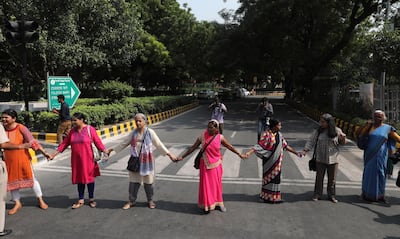
Some people claim the pendulum has swung too far, and there are anecdotes that show people misappropriating the “movement”, but they are just that, one-off stories. There are far more moments that point to a systematic issue: a man who was recorded brazenly talking about how consent didn’t apply to him because he was in a position of power, was elected as POTUS, even after everyone heard him say so. Roman Polanski (who raped a 13-year-old girl in 1977) is currently filming his next movie (J’accuse), which is sure to be lauded by critics. And, on a random day last month – November 19 – BBC journalists across the globe took note of the number of women killed in crimes in which the main motive was their gender: they found 47. In one day. Those were the ones reported.
5. We phased out the five-day work week?
Panna Munyal, Lifestyle Editor
The word “work” is attached to very contradictory phrases – on the one hand, we have people who seek to work hard but play harder, and on the other, those who are about all work and no play. Dull countenance aside, the latter group are at risk of working themselves into the ground in an attempt to work their way up.
One of the most alarming phrases I heard this year was "work-life integration", which is threatening to take over the more digestible "work-life balance". The latter throws up images of a holistic existence, where one has enough time to heed Leisure poet William Henry Davies's suggestion to stand and stare, while the former essentially suggests that life is about being constantly switched on.
Much was made earlier this year about a survey conducted by real estate group Perpetual Guardian, which found that getting its employees to work for 32 hours a week over four days – instead of 40 hours over five days – resulted in lower levels of stress, greater engagement and improved performance. The New Zealand-based company promptly decided to implement the change permanently, joining a growing number of others, most of which are located in countries that routinely appear on “world’s happiest” lists.
Saliha Afridi, clinical psychologist and founder of The LightHouse Centre for Wellbeing in Dubai says: “There is something about human nature that when you give someone less time, they get the same amount done as they would if you’d given them longer for the task. When you have less time, you are more focused.”
Balance is key, of course – balancing deadlines with attention spans, profits with productivity levels, and corporate growth / individual ambition with (insert as appropriate: family bonding / travel experiences / digital detox / interpersonal communication / me-time). After all, some of our best ideas emerge when we are relaxed, on holiday, interacting with others and, in my case, when I come to something fresh and well-rested.
A four-day week has the potential to allow us to implement what is currently my favourite adage: work smarter, not harder. After all, and on the fifth day we rested, works like a charm, too.
6. The next Despacito came from the Arab world?
Saeed Saeed, Arts & Music Writer
Judging by the uninspiring sounds on Arabic radio these days, the suggestion that the next global music hit should come from the region may seem laughable. But the talent exists. The clues that the Arab world could produce its first truly international hit point to the West rather than the region’s traditional pop music centres of Beirut and Cairo. Where those cities specialise in churning out radio-friendly fodder and the latest line of television talent quest-winners, a new generation of Arab and North African producers are making their mark in pop music elsewhere. If these talents were pooled, we’d have a good shot at creating a Mena-meets-West hit single.
In terms of the personnel who can achieve such a task, we are spoilt for choice. Two of pop music's most esteemed producers hail from the region. Palestinian-American DJ Khaled (Khaled Mohamed Khaled) has scored chart success for his anthemic brand of hip-hop, his knack for hashtag-friendly choruses and his formidable marketing skills. You also can't ignore RedOne (Nadir Khayat). The Moroccan-Swedish producer is been behind plenty of Lady Gaga's biggest hits, such as Just Dance and Poker Face. The Arab world also has a depth of talent when it comes to successful songwriters. Salem Al Fakir, a Swedish songwriter of Syrian descent, is responsible for huge melodies in the EDM scene, having penned hooks for the likes of Avicii (Brother and You Make Me) as well as Axwell – Ingrosso's More Than You Know. Katy Perry's Cozy Little Christmas, currently No 1 on Billboard's Adult Contemporary Chart, has a regional touch to it, with American-Jordanian songwriter Ferras Alqaisi having co-written the tune.
One of DJ Khaled's songs, we'd love him to work with more MENA region artists:
What’s missing and sorely needed, however, are creative exchanges between these international talents and Arab singers in the Mena region. With the exception of RedOne’s efforts to work with singers such as Saad Lamjarred and Ahmed Chawki, Arab pop stars are too comfortable working in the Cairo and Beirut bubble, and the end result is predictability. While vocal talent hailing from the region is undeniable – from veteran pop stars Amr Diab and Tamer Hosny to a new generation of singers such as Mohammed Assaf and Nassif Zeytoun – the knowledge to expand Arab pop music’s sound is lacking. This is where our brothers in the US and Europe can help.
Such an approach helped dance-hall and reggaeton escape their geographical confines and spread globally. For example, American artists such as Luis Fonsi of Despacito fame, Sean Paul (Temperature) and Enrique Iglesias (Duele El Corazon), reached out to colleagues in South America and Jamaica to create global hits that sound both modern and respectful of their music traditions. It is now time for Arab artists, from all corners of the globe, to band together and show the world what the region has to offer.
7. Facebook cured its ethical blindness?
Alkesh Sharma, Business Reporter
Facebook, let’s take a look back at the memories you made in 2018: Increased dislikes, a growing number of pledges to leave Facebook, warnings from governments and more! Sometimes looking back helps us remember what matters most, and we hope shielding user privacy tops this list in 2019 for Facebook.
The past year was one of explanations, apologies and regrets for Mark Zuckerberg, chief executive and founder of the greatest social media brand of our time. From answering questions from United States
Congressmen to getting fined and warned for data collection policies by countries across Europe, and finally the allegations of giving Netflix, Spotify and Royal Bank of Canada the liberty to read, write and delete users’ private messages, Facebook has had a fairly tough year, and rightfully so.
As it’s the time of the year when you plan to leave bygones and make resolutions for a better year, wouldn’t it be nice if Facebook took its ethical blindness seriously and found a cure for it? If the privacy and data of users were treated as paramount? If, apart from apologies, the social networking biggie compensated for the stolen or misused users’ confidential information?
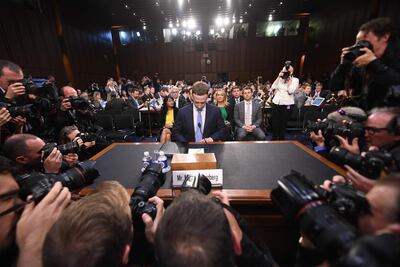
Apparently, the privacy issues – ranging from digital colonialism to mishandling of free basics – have plagued the image of Facebook for a long time and 2018 was no different, just adding to the pile of accusations and contentions. Almost $69 billion net-worth business is clearly suffering from fundamental ethical conflicts and this is costing more than 2.2 billion Facebook users their personal data – however the profits for the company continue to swell and top the charts.
It is painful, though, that the users, who are the real reason behind all the propelling growth this relatively young company has seen over the years, are apparently not the most cared-for stakeholders for Facebook. Users and their personal private information has been instead used as bait to catch big fish in the market and bring in even bigger revenues.
But if you look at the issue from a technological point of view, it is easier said than done. The concept of complete privacy is a subjective matter but completely in hand of the hosting platform. Plus, the privacy agreement that contains hundreds of clauses and terms, comes to the rescue of companies like Facebook every now and then. The idea of being ethical therefore makes more sense than ever.
We hope 2019 makes for a more trustworthy and digitally secure year for Facebook users. We also hope that Facebook lives by the words it put out in a recent print ad saying, “We have a responsibility to protect your information. If we can’t, we don’t deserve it.”
8. Meat, eggs and dairy came with a warning label?
Katy Gillett, Assistant Features Editor
“This package contains the decomposing flesh of a once-live animal that had a face!” “Factory farming is destroying the planet!” “A mother had to lose its baby just so you can have milk in your tea!” “An egg is the product of a hen’s menstrual cycle!” Too far?
It’s so easy, once it’s all been wiped of the blood and pus, and neatly packaged up, to forget what it is you’re eating, particularly when it’s well-seasoned. But take a closer look at cow’s milk, for example. It’s designed to turn a baby cow into a full-grown bovine in a few weeks. And we wonder why many of us are overweight; our hormones are out of control; arteries are being fatally clogged by the millions. (Also, FYI, spinach and chickpeas are far superior sources of calcium than a glass of milk. There’s a reason why all vegans love hummus.)
No other animal on the planet drinks the breast milk of another creature. We humans are perfectly willing to – from a cow, goat, sheep, even camel – and yet we find drinking our own breast milk disgusting. How does that make any sense? Do I sound too extreme? Surely what’s extreme is the mass slaughter of billions of animals every year, when 821 million people – one in nine – go hungry every day, according to the World Food Programme. And one in three suffer from some form of malnutrition. Even more incredible when you consider an estimated 80 per cent of all agricultural land is dedicated to the production of feed. So we’re taking up all that land, and using all that money, to feed our foodstuffs food we could have just eaten in the first place. That’s mad, right?
On the flip side, here are a few labels I’d like to see printed on plant-based food: “Contains protein!” “Will not cause malnutrition!” “Has plenty of flavour!” “Eating this will not turn you into a hippy know-it-all!” What would be really great is if the tide of information flipped the tables on society’s stance, and omnivores become the “strange”, “extreme” ones in 2019. Oh, and the vegan options begin to far exceed the meat- and dairy-laden dishes on restaurants’ menus.
9. Trolls did us a favour and all logged off?
Rhodri Marsden, Tech Columnist
It can often feel as if online discourse is becoming more toxic with every passing day. In some ways this isn’t surprising – we’re never far from a potential geopolitical crisis. But it’s not as if we need the provocation of a sabre-rattling speech to start arguing on Facebook, Twitter or any number of online forums. The origin of hummus, the correct spelling of yoghurt and the PC vs Macintosh debate are just three countless quarrels that continue to provoke accusation and recrimination, threat and counter-threat. And we are so easily dragged into these exchanges, forgetting that they merely entrench the opinions of everyone involved and solve nothing.
In the real world, acts of kindness reassure us of our humanity constantly and remind us that people can be polite and courteous. But in front of a laptop, tablet or phone, for some reason, we become markedly less civil. It wasn’t meant to be like this, of course. Tim Berners-Lee, the inventor of the world wide web, saw his creation as a utopian tool that would lead to “more understanding”, and social media companies have always made well-meaning promises to bring the citizens of the world together in a happy congregation. But the internet has problems that simply aren’t conducive to good manners. Anonymity allows us to be as unpleasant as we want, without fear of repercussions. Policing of bad behaviour is notoriously lenient. The emotional rush of an untrammelled argument has an addictive quality. And so the worst parts of our nature run rampant, while empathy becomes suppressed.
It feels a bit futile to wish for a new atmosphere of tolerance in 2019, but it’s possible for each of us to do our bit. We can imagine our sparring partners as real people, with feelings. We could think twice before unleashing our anger, taking a moment to consider other viewpoints and the things we might share, which in turn will naturally lead to empathy. These simple acts evidently won’t make the problems of the internet evaporate, but on a personal level they may at least bring us some respite, a drop in blood pressure and a slightly calmer day.
10. The US and China made up?
Kelsey Warner, Assistant Business Editor
Much ink has been spilled over worst-case scenarios in the United States-China trade war. The catastrophising has not only heated up reporters' keyboards, but also contributed to a historically bad global market rout, sent major American retailers on a Chinese spending spree on everything from microwaves to bikinis ahead of tariffs on January 1, and triggered the International Monetary Fund to reduce the economic growth outlook globally in 2019. But what if the world's two biggest economies made peace? Once you clear the haunting image of Presidents Xi Jinping and Donald Trump singing Kumbaya around a campfire from your mind, here's how it might actually look:
1. Calmed automakers. Trump has imposed a 25 per cent tariff on vehicles imported from China, and China hit the US with 40 per cent tariffs on cars imported from the US, prompting higher sticker prices on Teslas and Priuses, while throwing a wrench into US-to-China productions of Mercedes and BMW. Exacerbating this dynamic, last May Trump levied large tariffs on aluminium and steel imports (the stuff cars are made of) from its trade allies the EU, Mexico and Canada – with steel imports from those places taxed at 25 per cent and aluminium imports at 10 per cent; up from under three per cent previously. Taken together, automakers have vocalised these tariffs are not good for business. Ford chief executive James Hackett said in September that tariffs cost the company about $1 billion (Dh3.67bn) in profit. GM warned in June that they could lead to a "reduced presence" in the US and abroad. It delivered on this warning earlier this month by closing factories in the US and cutting nearly 15,000 jobs. A Xi-Trump peace agreement would go a long way in settling this most unsettled industry.
2. Cooled commodities. There is no better measuring stick for the US-China trade war than the American soybean. China, the world's top buyer, typically purchases most of its oilseed imports from the US in the last quarter of the year as farmers harvest their crops and go to market. The US was the second-largest supplier of soybeans to China and the trade was worth $12bn in 2017, according to Reuters. In November of this year, that figure was $0. In response, the US Department of Agriculture has pledged $12bn in aid to US farmers. With the Federal government shut down over a $5bn line item (the wall at the border with Mexico) it is easy to see how that capital could be used elsewhere – if not to build a wall then to invest in something other than propping up hard-working farmers with no buyer for their crop.
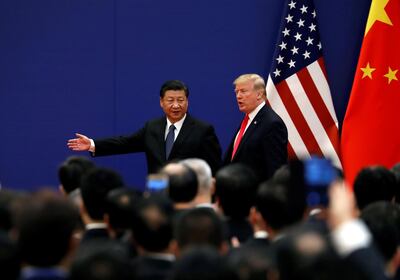
3. Composed equities. Global markets have been in a nosedive over fears of slowed growth next year, spurred by trade tensions. Higher tariffs mean less money in company coffers to invest in fun pursuits such as research, innovation and glossy new advertising campaigns – activities that cost a lot in the short-term but can pay dividends when they drum up things like life-saving drugs, trendy technology and / or greater product demand. All of that gets put on hold when companies are quaking in their boots.
I know, this is a hyper-simplification of one of the worst economic stand-offs in recent memory. But wouldn’t it be nice if the trade war ended?
11. Female athletes were treated with respect?
Evelyn Lau, Assistant Features Editor
When Norwegian striker Ada Hegerberg won the inaugural women’s Ballon d’Or honouring her as the best female footballer, her accomplishment was overshadowed by the fact one of the presenters asked her to twerk after accepting the award. News spread rather quickly about the incident – instead of a story about her triumph, the moment became focused on her embarrassment. And it’s undeniable, no one would ask this of Lionel Messi or Cristiano Ronaldo.

Female athletes have long had to struggle to even get close to being treated with the reverence afforded to their male peers. In a world where women are still battling for equality, I would like to see the sports world take a stance. Serena Williams is a prime example: as one of the greatest tennis players of all-time, whose matches have helped elevate the sport, she still has to struggle. Earlier this year, the French Open banned her customised catsuit (which she says helps with her blood clots after a difficult pregnancy) from competition when a new dress code was announced, stating that players “must respect the game and the place.”
But, in terms of respect, what about respecting a woman’s right to wear what she wants and what she’s comfortable with while competing? What kind of message does this send to young girls when suddenly they hear their favourite athlete isn’t allowed to wear something as if she’s actually done something wrong? She must wear a skirt instead? No one ever questions whether LeBron James’ basketball shorts show too much leg or whether Tom Brady’s football pants are too tight.
Also, when a female tennis player speaks up or gets emotional during a match, she’s viewed as being difficult but when a male player does the same (i.e John McEnroe), he’s lauded for his passion towards the game. For young girls around the world, these things matter. I’ll always remember watching US gymnast Shannon Miller compete at the 1992 Barcelona Olympics, and knowing I wanted to do the same. Spending my childhood immersed in a sport taught me discipline, and it helped me embrace an active and healthy lifestyle early on.
I wish I had continued with it but, like many women, I stopped when other responsibilities arose and it became clear to me that women in sport have fewer pathways. I hope that female athletes are one day viewed with the same respect as their male counterparts, because I can only imagine what the world would be like if women were given the impression, and reality, that they too could excel in anything they wanted.
_______________
Read more:
2018 in review: hopes for Hyperloop the only good news for tech

